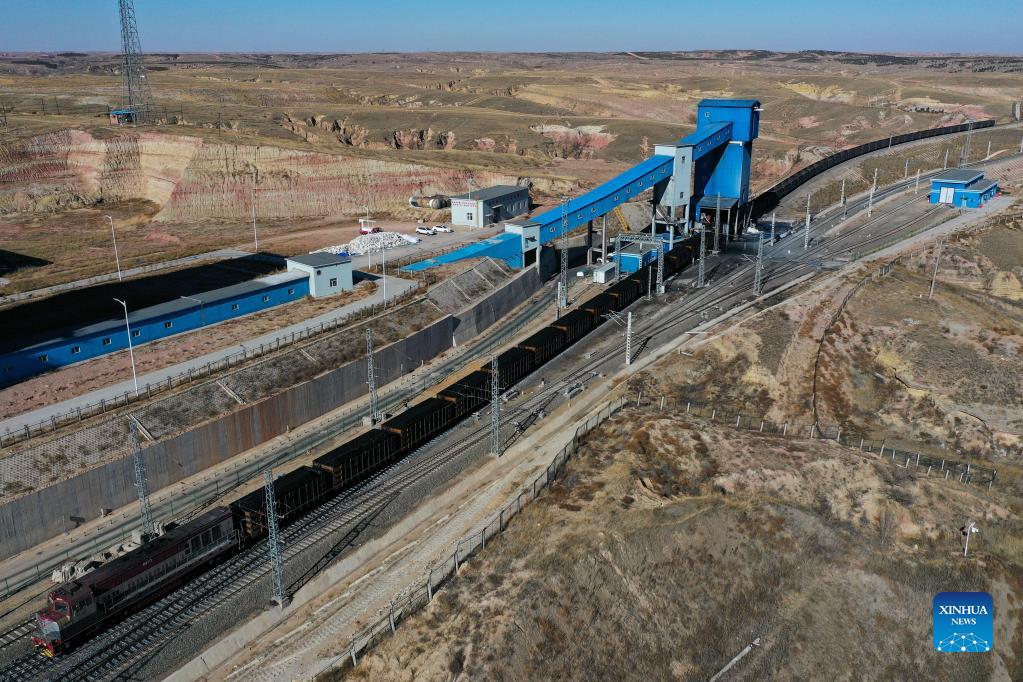
Aerial photo taken on Nov. 23, 2021 shows a train being loaded at a loading station of a coal mine in Erdos, north China's Inner Mongolia Autonomous Region.(Xinhua/Li Zhipeng)
BEIJING, Jan. 6 (Xinhua) -- Having been through a tough year in energy production, China will make all-out efforts to ensure coal production and keep coal prices at a reasonable level in 2022.
As measures to increase production have paid off, the coal supply and demand have continued to improve, with intelligent and green energy playing a big role in energy supply.
PREVIOUS EFFORTS
The tight supply and high demand for power, a dilemma besetting China's power industry since the start of 2021, worsened in September and October due to the short supply and price hikes of coal. At the time, multiple provinces in the country reported power rationing, with some regions experiencing power cuts.
Following the September power blackouts, in a series of meetings, the country stressed the importance of efforts to prioritize energy sufficiency. At an executive meeting of the State Council in late October, China ordered concerted efforts to ensure coal production and transportation, increase the gas supply and crack down on speculative activities in the market.
An improved pricing mechanism for coal-fired power was also released to deepen market-oriented pricing reform in the sector.
Since October, coal enterprises have also been promoting coal supply and stabilizing prices.
Huayang New Material Technology Group Co., Ltd., a coal producer in north China's Shanxi Province, one of China's major coal-producing regions, has been improving its mining technology and operating at full capacity, with half of its output being transported to south China's Hainan Province.
By December 22, 2021, Huayang had completed the shipment of 1.7 million tonnes of thermal coal to Hainan ahead of schedule.
These timely measures, at both the local and central levels, proved effective in restoring the near-term coal supply and helped gradually ease the strain on power generation, industry insiders noted.
Spot prices and coal futures have slumped rapidly since mid-October as long-term supply contracts cover more coal producers while supervision is strengthened to rein in excessive speculation. By early November, power supply and demand in areas operated by the State Grid had returned to normal.
SMART MINING HELPS
Intelligent technologies have become an important support for increasing the production and supply of coal.
The city of Yulin, a coal-producing area in northwest China's Shaanxi Province, has built 20 modern ultra-large coal mines with a capacity accounting for 50 percent of the city's total output.
At Shaanxi Coal Caojiatan Mining Co., Ltd., an intelligent monitoring system connected to phone applications helps workers dispatch and monitor the real-time operation of equipment and the production process.
"With the help of the smart devices, the actual number of workers in a mining team has been reduced from 15 to seven. Now, just seven people can produce 3,500 tonnes of raw coal in two hours," said Li Peichen, a mining team Party chief with the company.
Also, a total of 154 intelligent mining areas have been built in Shanxi Province, with the capacity of technologically advanced production accounting for 68 percent of the total.
FUTURE STEPS
As the growth of global energy demand slows down and supply constraints ease, the mismatch between supply and demand is expected to improve in 2022, according to experts.
Meanwhile, the domestic coal supply capacity will be further enhanced in 2022 as relevant government departments increase production capacity, according to industry insiders.
In 2022, the medium- and long-term coal contract system will be further improved.
Recently, a batch of long-term contracts were signed by coal enterprises from Shanxi, Shaanxi, Inner Mongolia and other places, together with some large domestic electricity, steel, heating enterprises, which will further stabilize price expectations and promote stable energy supply.
The country will also continue to increase the absorptive capacity of new energy, and optimize the use of coal and new energy. Large firms, especially state-owned enterprises, are working on the front lines of securing the power supply and stabilizing prices.




 A single purchase
A single purchase









